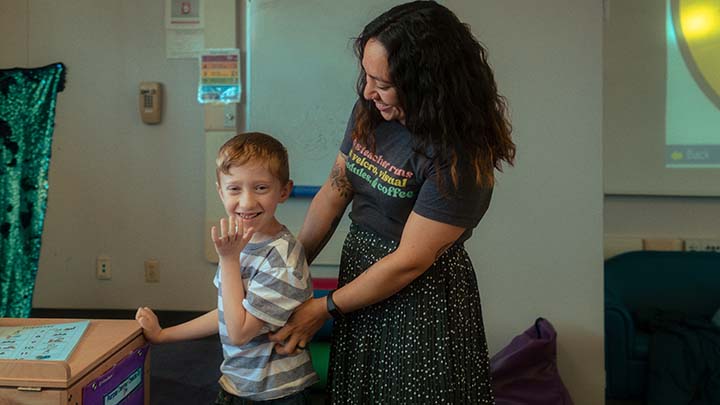Making a splash: SDSU builds partnerships locally and nationally to improve special education
Associate professor Lauren Collins nets two Office of Special Education Programs grants to prepare educators and administrators to better serve diverse students with disabilities.

San Diego State University has received two significant personnel preparation grants aimed at improving special education outcomes in diverse districts both locally and nationally.
Lauren Collins, associate professor in the Department of Special Education, is the principal investigator on both projects funded by the U.S. Department of Education’s Office of Special Education Programs (OSEP) to the tune of nearly $5 million.
- Project SPLASH is a $1.2 million effort to fund two cohorts of new special education teachers in partnership with diverse, high-need districts in San Diego County.
- Project PARTNERS is a $3.7 million initiative in collaboration with the University of Virginia and University of Illinois Chicago to immerse educational leadership doctoral students in culturally and linguistically responsive, evidence-based methods of teaching children with disabilities.
“For me it all comes back to supporting students with disabilities,” said Collins, a former special education teacher who completed her own Ph.D. thanks to an OSEP-funded scholarship.
“That’s where I started and that’s where my passion is. We're hoping to prepare students with disabilities to succeed — not just academically but behaviorally and socially — in our schools and after they graduate. Personnel prep grants are one of the best ways we can do that.”
Project SPLASH
Spanning much of the rugged backcountry and serving three bands of the Kumeyaay Nation, Mountain Empire Unified School District is one of San Diego County’s smallest districts by population, but largest by geography. And its remoteness poses problems.
“We're sitting on vacancies that we haven't been able to fill and it does a real disservice to our students,” explained Jon McEvoy, the district’s director of special education and human resources. “It gets difficult to recruit out here. That’s really why we want to grow our own people.”
Through Project SPLASH, Mountain Empire, San Ysidro School District and Cajon Valley School District are joining forces with SDSU to do just that. All three districts have about 60% of their students facing socioeconomic disadvantages as well as high numbers of multilingual learners who also qualify for special education instruction.
The OSEP funding will support two cohorts totaling 16 Educational Specialist Instructional Credential candidates who will be recruited from communities served by the districts.
The hope is to engage classified staff and special education paraprofessionals already working in the schools and even local parents interested in becoming teachers.
Candidates will receive fully-funded tuition for their SDSU preliminary and clear credential programs, as well as a $10,000 stipend to cover expenses while they complete their student teaching. The first cohort will enroll in summer 2025.
In the meantime, SDSU will work to assemble an advisory board made up of members from the three communities those districts serve.
“The idea is that when you have a teacher who's connected in the community and with the parents, they are more likely to stay," Collins said.
Added McEvoy: “My hope is that when the kids come to school and they see the teachers that are educating them, they're seeing themselves. That’s motivation.”
Project PARTNERS
Among district and school leadership, there is not always a firm understanding of how to best support students with disabilities. Collins notes that in California, only 12% of principals hold a doctoral degree while only 27% have training in special education.
“In most buildings, assistant principals are tasked with overseeing the special education process in terms of eligibility, identification and then implementation of IEPs (Individualized Education Programs),” Collins said. “If we don't have training in those areas, it's really hard to support the special education teachers that you're working with to ensure both compliance and quality of IEPs.”
Project PARTNERS will fund 11 doctoral students pursuing a concentration in special education at SDSU, UVA and UIC — universities strategically chosen to cover both urban and rural communities. Five of those students will be part of a cohort enrolling next summer in SDSU’s Ed.D. program in educational leadership, which prepares school principals, district superintendents and other administrators. Ed.D. students at SDSU will collaborate with Ph.D. students at UVA and UIC, with the goal of creating a nationwide network of future university and school leaders.
In addition to receiving funding to cover tuition and other expenses, SDSU scholars will have the opportunity to visit high performing schools in partnership with the National Center for Urban School Transformation, complete teaching and collaborative research apprenticeships and engage in professional learning communities.
“For both grants, we are going to recruit highly diverse, high-quality scholars,” Collins. “What I think is really cool is that we now have funding to support special educators in three levels of credentialing: preliminary, clear, and administrative. We are going to help improve the outcomes of students with disabilities by preparing those who have significant impacts on their education, and that’s super exciting.”



